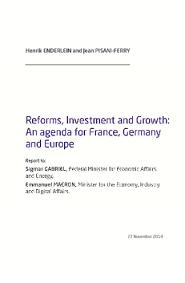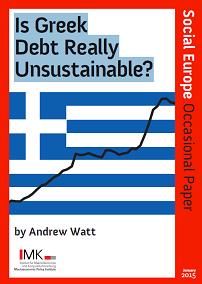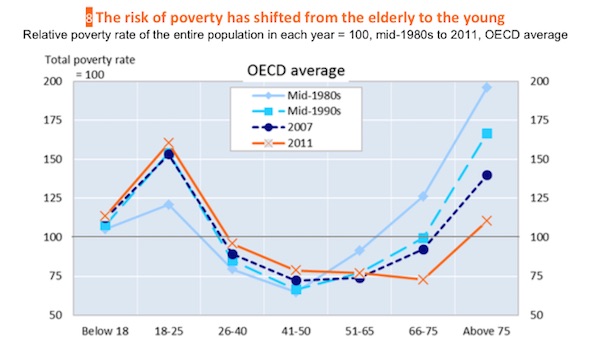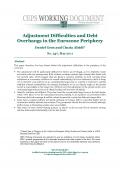Brzeski, C. (2015) “Calling the eurozone’s bluff?“, EU Observer Opinion, 14 Ιανουαρίου. Next week’s events have the clear potential to plant the seeds for another eurozone crisis. Not an immediate one with sharp market turmoil, but rather a creeping one: the sneaking and growing awareness that the eurozone is far from being perfect. On 22 January, the European Central Bank (ECB) will plant the first seed. It will be …Read More
Reforms, Investment and Growth: An Agenda for France, Germany and Europe
Enderlein, H. & Pisani-Ferry, J. (2014) “Reforms, Investment and Growth: An Agenda for France, Germany and Europe“, Report to Sigmar Gabriel (Federal Minister for Economic Affairs and Energy) and Emmanuel Macron (Minister for the Economy, Industry and Digital Affairs, 27 Νοεμβρίου. INTRODUCTION Europe is falling into a stagnation trap: growth is barely noticeable; current inflation is dangerously low; almost stagnant nominal income makes the weight of public and private …Read More
How to reduce the Greek debt burden?
Darvas, Z. & Hüttl, P. (2015) “How to reduce the Greek debt burden? – There are options to reduce the net present value of Greek public debt servicing costs by more than 15 percent of GDP without incurring losses on creditors, Bruegel Institute Analyses, 09 Ιανουαρίου. The Greek debt reduction issue has been put back on the table as the 25 January 2015 parliamentary snap elections are approaching. Already in …Read More
Is Greek Public Debt Unsustainable? It’s The (nominal growth rate of the) Economy, Stupid!
Watt, A. (2015) “Is Greek Public Debt Unsustainable? It’s The (nominal growth rate of the) Economy, Stupid!“, Social Europe Journal, Occasional Papers No. 6, Ιανουάριος. Greece will go to the polls on January 25th and everybody from German conservatives to Greek leftists seems to agree: Greek public debt is unsustainable. A haircut on investors and some form of partial default – more politely known as debt restructuring – is …Read More
While Europe debates a placebo the disaster deepens
Mitchell, B. (2015) “While Europe debates a placebo the disaster deepens“, Bill Mitchell Blog: Modern Monetary Theory… Macroeconomic Reality, 12 Ιανουαρίου. The youth are our future. The future is for our youth. Poverty used to be a problem of the aged as they left employment and entered retirement. Shorter life spans than now meant it was a relatively short-lived but deplorable state for people to end in. All that …Read More
Το Grexit έχει λιγότερους κινδύνους για την Ευρωζώνη
Εικονογράφηση: Τιτίνα Χαλματζή, Πηγή: Καθημερινή. Χαλιάσος, Μιχάλης (2015) “Το Grexit έχει λιγότερους κινδύνους για την Ευρωζώνη“, Εφημερίδα Καθημερινή, 11 Ιανουαρίου. «Εχουμε πάρει απλώς παυσίπονα για να αντιμετωπίσουμε τα συμπτώματα. Δεν έχουμε φτάσει στην αιτία του προβλήματος». Ετσι εξηγεί ο Μιχάλης Χαλιάσος, καθηγητής Οικονομικών στο Πανεπιστήμιο Goethe της Φρανκφούρτης, την αρνητική του απάντηση στο ερώτημα της «Κ» αν τα πλεονάσματα που έχει πετύχει η Ελλάδα, μετά έξι χρόνια ύφεσης και …Read More
Debt relief for Greece is necessary to avoid a crisis in the Eurozone
De Grauwe, Ρ. (2015) “Debt relief for Greece is necessary to avoid a crisis in the Eurozone“, LSE EUROPP, 12 Ιανουαρίου. On 25 January Greece will hold parliamentary elections. The elections have generated uncertainty in the Eurozone given the potential for the radical left party Syriza, which has called for a renegotiation of the country’s bailout conditions, to emerge as the largest party. Paul De Grauwe writes that even …Read More
The impact of fiscal austerity on suicide: On the empirics of a modern Greek tragedy
Antonakakis, N. & Collins, A. (2015) “The impact of fiscal austerity on suicide: On the empirics of a modern Greek tragedy“, Social Science and Medicine Journal, Volume 112, Ιούλιος 2014, σσ. 39-50. Highlights We examine the effects of fiscal austerity on suicide in Greece over the period 1968–2011. The effects of fiscal austerity and economic growth are gender- and age-specific. Fiscal austerity affects only the male population, …Read More
The Greek Election 2015 – Revolt Of The Debtors
De Grauwe, P. (2015) “The Greek Election 2015 – Revolt Of The Debtors“, Social Europe Journal, 05 Ιανουαρίου. The Greek debt crisis that erupted in 2010 is back and again threatens the stability of the Eurozone. That crisis was the result of two factors. First, an unbridled spending drift of both the private and the public sectors in Greece during the boom years of 2000-2010, which led to unsustainable …Read More
Reinsurance of National Unemployment Benefit Schemes
Beblavý, Μ., Gros, D. & Maselli, I. (2015) “Reinsurance of National Unemployment Benefit Schemes“, Social welfare policies, CEPS Working Documents, Centre for European Policy Studies, 08 Ιανουαρίου. This study is a contribution to the debate around the creation of an unemployment insurance scheme for the EU/euro area by proposing an alternative mechanism to the Europeanisation of national insurance schemes. The authors make the case for a reinsurance mechanism and show that …Read More












